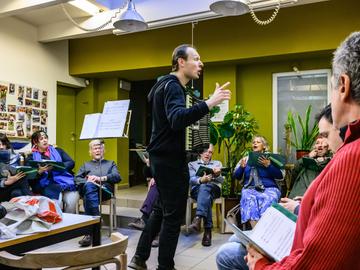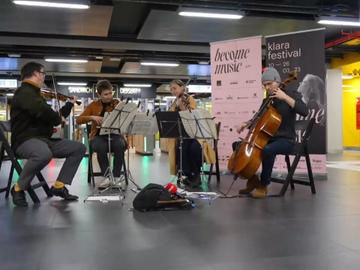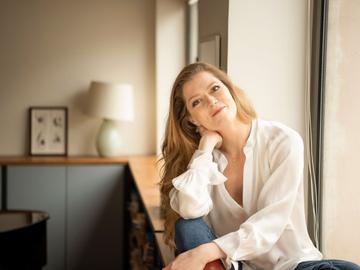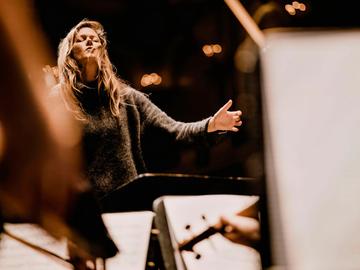“It is not an obvious step, but a very deliberate one,” says intendant Joost Fonteyne about KlaraFestival's desire over the next few years to connect with the diverse urban fabric of Brussels. Musikaa sets its sights on Molenbeek and is an encouraging first step.
© Alina Horodyska, Huis van Culturen en Sociale Samenhang
That you should not tell him anything about his future if you kill his brother. That he is afraid to walk through the city. And Mama, that he cannot breathe. The frustrations and the fear come from the mouth of Samuel-Ulrich Boni (stage name: Alias). In “Respire Floyd”, he crawls into the skin of the late George Floyd. The empathy of this young man from the Ivory Coast, stranded in Brussels, is considerable. What is new is that this time, he is accompanied by a real string quartet. They have also taken the trouble to adapt to the rhythm of the young rapper. The cross-pollination between the language of the street and that of the concert hall touches a sensitive chord. The song combines combativeness with melancholy and can be heard in one of the five Musikaa video portraits from 21 March onwards. These will be available on the KlaraFestival website or – better still – you can call them up with a simple QR scan on your smartphone while walking through Molenbeek.
To organise Musikaa, KlaraFestival and Bozar entered into a partnership with the commune of Molenbeek and five organisations with experience of supporting local talent. Boni, for example, is a regular guest at the MolenBerlin youth workshop of the Huis van Culturen en Sociale Samenhang/Maison des Cultures et de la Cohésion Sociale. Musikaa offered pianist and composer Samir Bendimered, who supervises the studio, the chance to pair the young rapper and other talents from his studio with cellist Guy Danel and the Dónisi Quartet from the nearby Chamber Music for Europe. “They normally only play scores. Here, they had to be a bit more flexible, because rap and slam are not written down. That also means improvising. But not only the string quartet had to adapt. For example, I had asked Samuel to do some classical dance steps during his performance. To really meet each other, everyone had to step out of their comfort zone.”
This project offers opportunities that do not present themselves every day to the young of Molenbeek, who before the pandemic already had the sense of living in a kind of lockdown
This is the kind of encounter that KlaraFestival is aiming for with Musikaa, where it first scratches the surface and then connects. “Searching for the urban fabric and paying more attention to the colourful Brussels will remain our main ambition in the coming years, even when we are allowed to organise concerts for an audience again,” emphasises Joost Fonteyne, the festival's intendant. “It is not an easy step, but it is a very conscious one. This focus on more diversity has not come out of the blue. Although Fonteyne says he does not have any numbers for the exact reach of KlaraFestival, the impression is that the audience consists mainly of white Flemish people. “But we are a festival in Brussels, and in that sense we also have to take the responsibility of working with Brussels. Together with local organisations, Musikaa wants to set up a multi-year programme in Molenbeek but we will also focus more on diversity within our regular concert work.”
From concert hall to street corner
It is not just artists from Molenbeek that can benefit from these cross-pollinations, people from outside can also let their light shine. Poet and DJ Alex Deforce, who lives in Anderlecht, was asked by the Vaartkapoen for a short residency with three other musicians. He was familiar with reed player Jordi Grognard, who we know from the jazz collective Yôkaï, and producer Maurizio Athome, but he did not know oud player and local resident Abid Bahri. “He seems to have lived on the same street as the Vaartkapoen for over 25 years. I am the only white Belgian in the company. Communication was also mainly in French, so I spontaneously started writing in French.”
His new ensemble improvises on a poem for which Deforce found inspiration while walking through Molenbeek, like a fly on the wall. “I describe the district as a collection of street corners. If you turn your visor 180 degrees on one of these street corners, you are in people's living room. That's how I want to highlight its versatility. I also see Molenbeek as a postcode with a problem, and that problem is mainly its image.”
That image, dented by the attacks, was also one of the reasons KlaraFestival wanted to focus on it. “In fact, it is a kind of invitation in both directions,” says Bert Collijs, who is responsible for social projects at the festival. “To our audience to discover how beautiful Molenbeek is if you look past the clichés, and to the people of Molenbeek to help think about how this project can evolve in the years to come. Just because we propose a particular route with QR codes this year, that does not mean we have to do the same next year.”
While walking through Molenbeek, Deforce noticed the group spirit. “There is something of a village about the commune because of the presence of different generations. People are anchored here, so there is also social control. You cannot do just anything, because your neighbour may have seen it and stopped you in your tracks. In some parts of Kuregem/Cureghem or Schaarbeek/Schaerbeek, there is much less this anchoring. There, you notice that nobody really has roots.”
Glass ceiling
Bendimered believes that such anchoring offers better stepping stones to rapprochement. “As long as you, as an outsider, are aware of the glass ceiling still bothering everyone here. This ceiling prevents minorities from being discovered and from breaking out, also because the media prefer to talk about the criminal who smashes a car window. Someone like Samuel was, of course, filled with joy when he was able to work with a string quartet. This project offers opportunities that do not present themselves every day to the young of Molenbeek, who before the pandemic already had the sense of living in a kind of lockdown. Even though they did positive things, they remained invisible. It was not for nothing that my studio was working on the theme of the exiled city even before corona broke out.”
For the occasion, Bendimered also wrote an arrangement for the Dónisi Quartet to a song by Lebanese composer Marcel Khalife. “Ousfour”, an iconic text by the Palestinian poet Mahmoud Darwish, is often used in the context of political prisoners. “The song is about a bird that loses its freedom, searches for it and finds it again. The lyrics are sung in Arabic by Marie Maloux, a girl from the studio who does not actually speak Arabic. Now that our freedom has been taken away from us, it speaks to our imagination again.” But, “Es ist noch nicht alles verloren”, to use the slogan of this digital edition of the KlaraFestival. All is not yet lost.
With there being musical cross-pollinations from LaVallée too, the Migration Museum and MetX, the scope of artistic projects at the first edition of Musikaa is immediately very diverse. The fact that both the video portraits and the artist photos were made in local youth studios is crucial. “That interaction is very important to us”, Fonteyne concludes. “We are not missionaries. From the start, the commitment has been to do this together. The message was: we want to learn from you, and maybe you will learn something from us. That includes humility towards the organisations that have each, in their own way, already achieved a lot in Molenbeek.”
KlaraFestival 2021: The Digital Experience
13 > 22/3 (Musikaa: 21/3, 15.00), www.klarafestival.be
Read more about: Events & Festivals , Muziek , Klarafestival , musikaa



